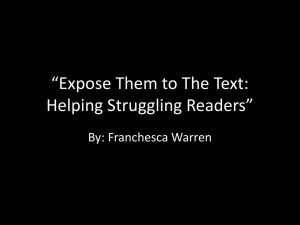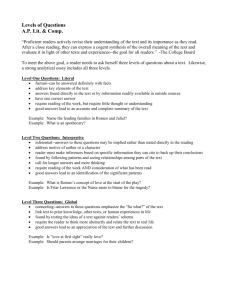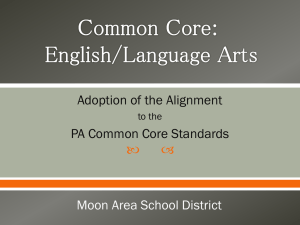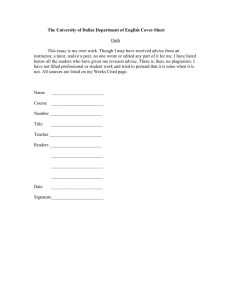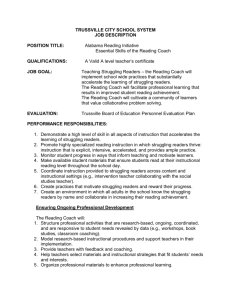ExposeThemtotheTextKennesaw
advertisement
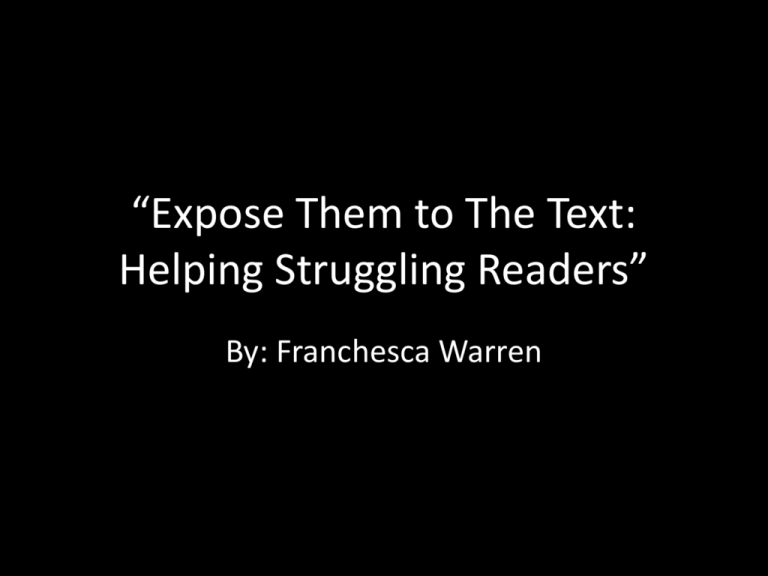
“Expose Them to The Text: Helping Struggling Readers” By: Franchesca Warren What does this say? • Mi nombre es Sangeeta. Tengo 11 años. Vivo en Nueva Delhi, India con mi padre, madre, dos hermanos y tres hermanas. Mis abuelos también viven con nosotros. En la India, la familia es muy importante. Es común tener abuelos, tías, tíos y/o primos viviendo en la misma casa. Mis tías, tíos y primos también viven cerca. Nos vemos a menudo. Mi hermano mayor es programador de computadoras. Ahora mismo, él está en Australia. Su compañía lo envió allá por un año. Todos lo extrañamos mucho. Le escribimos cartas cada semana. Yo quiero que él venga a casa pronto. • My name is Sangeeta. I am 11. I live in New Delhi, India with my father, mother, two brothers and three sisters. My grandparents also live with us. In India, family is very important. It is common to have grandparents, aunts, uncles and/or cousins living in the same house. My aunts, uncles and cousins also live nearby. We see each other often. My older brother is a computer programmer. Right now, he is in Australia. His company sent him there for one year. We all miss him a lot. We write him letters every week. I want him to come home soon. Franchesca Warren • Taught ELA for 13 years in metro Atlanta area and Memphis City Schools • Teacher of the Year for South Atlanta School of Law 2012-2013 school year • Author of two books, Behind the Desk: How I Survived My First Ten Years in Education and Keep the Fire Burning: Avoiding Teacher Burnout • Has taught every ELA class offered: Ninth Grade Literature, World Literature, American Literature, British Literature, Multicultural Literature, Journalism, etc National Institute for Literacy and the Center for Educational Statistics 40 • ______million adults in the U.S. are functionally illiterate. 40 percent of all 4th graders •About ____ lack the most basic reading skills. More Hard Data.. • • • Approximately six million of the nation’s secondary school students are reading well below grade level (Alliance for Excellent Education, 2002, 2003). More than 3,000 students drop out of high school every day (Alliance for Excellent Education, 2003), and one of the most commonly cited reasons for the dropout rate is that students do not have the literacy skills to keep up with the curriculum (Kamil, 2003; Snow & Biancarosa, 2003). Low literacy levels often prevent students from mastering other subjects (Alliance for Excellent Education, 2002). Poor readers struggle to learn in textheavy courses and are frequently blocked from taking academically more challenging courses (Au, 2000). Data from my school • In my Ninth Grade Literature class, approximately half of my class read below a 4th grade level . • In my World Literature class, there was a mixture of special needs , ESL and struggling readers who were all reading below an middle school level. • So what do you do when your students are expected to read classics such as “Romeo and Juliet” and “Hamlet”, to name a few? So what does that mean? • Students are struggling with reading complex texts we are tasked to having them read in the classroom. • So the question remains.. – How can we expose students to the actual text, yet meet them on their reading level? – How can we make students better readers? “Jabberwocky” Activity • Using the poem “Jabberwocky” lets read this poem (as a student) and see if we can determine the meaning of this poem. Activity #1 --Debrief • What were some of the struggles you experienced? • How did those struggles make you feel? • Now think if you were a high school student, how would you display those frustrations? So can we help students? • In our classrooms we’re mandated to have students read classics such as: Romeo and Juliet, Hamlet, Things Fall Apart, Beowulf and a host of other complex text. • Understand that a reading deficiency can be helped by giving students resources and strategies that will help guide them through the text. • Those resources include: leveled text, graphic organizers, vocabulary strategies, Spark Notes summaries, etc. Suggestion #1- Make leveled text an integral part of your reading process. Why Use Leveled Text? • Gives students access to the content and allows them to stay abreast of the novel. • Doesn’t make the students feel defeated when they encounter difficult texts. • Gives students confidence to attempt to read the harder text. What should you do before you use leveled text? • When introducing a unit, give students a glimpse of the actual text. • For example, annotating and dissecting the prologue in “Romeo and Juliet” is a great tool to expose students to the text. • Give students text dependent questions, based on that excerpt to force students to engage in the text. Prologue- Romeo and Juliet Two households, both alike in dignity, In fair Verona, where we lay our scene, From ancient grudge break to new mutiny, Where civil blood makes civil hands unclean. From forth the fatal loins of these two foes A pair of star-cross'd lovers take their life; Whose misadventured piteous overthrows Do with their death bury their parents' strife. The fearful passage of their death-mark'd love, And the continuance of their parents' rage, Which, but their children's end, nought could remove, Is now the two hours' traffic of our stage; The which if you with patient ears attend, What here shall miss, our toil shall strive to mend. Used as an adjective, civil is generally defined as “polite”. Replace the first appearance of the word civil in line 4 with the word polite. How does this substitution change your understanding of the sentence? What should you do when you use a leveled text? • Make sure that students always have a copy of the leveled text to refer to as they read. • If need be, make copies for students to annotate. • Allow struggling students to read the leveled text FIRST before they delve into the actual text. • Give ALL students access to the text. Suggestion #2- Engage students in the vocabulary early in the unit. • Preview difficult vocabulary. • Students need to know the words that may give them trouble at the beginning of the unit. • Use those words in class frequently. • Make those words come alive by engaging in activities that allow students to understand the word associations. Activity #2 • Now lets further examine the text “Jabberwocky.” – Annotating the TEXT is KEY for STRUGGLING readers. – Identify the words students may not know in this poem. – Underline any words that they may recognize. – Circle any words that may contain symbolism. Suggestion #3- Engage students in the text using text dependent questions. • Use text dependent questions to engage students in the text. • Break down the questions so that they address all aspects(comprehension, style, structure, etc.) of the text. • Give students TIME to work through the questions. • Pair them with a student who can help them “break down” the question. Suggestion #4- Annotate, Annotate, Annotate • Annotation allows students to engage in the meaning of the text. • Use various colors to annotate (in various colors) the text as they read. • Encourage students to get active in their reading. Have students refer to their text often. Suggestion #5- Audio Helps! • Allow students to listen to the text on audio as they listen to the text. • Chunk parts of the film version (if applicable) to the text. • Ask students to compare sections of the text using graphic organizers. • Gives students a visual to what they read and helps with the pronunciation of vocabulary. Suggestion #6Assessing Struggling Readers • Authentic Projects- Use projects that make students think about the text in different ways. • Plan short formative assessments on key skills. • Chunk the summative assessment so that students are not overwhelmed with so much reading. Activity #3 • Take a moment and use the internet to find an example of a formative and summative assessment on a text you would use in your ELA class. • Now how could you differentiate these for struggling readers? • What are some other ways we can assess these students? From Struggling Reader to Valedictorian • http://www.youtube.com/watch?v=1_8o_FHs fnk Other Resources to Help Struggling Readers www.lingro.com www.schmoop.com http://etc.usf.edu/lit2go/89/ beowulf/1511/chapter-1/ www.thugnotes.com http://www.youtube.com/w atch?v=LxEs-K8o1MI http://www.bbc.co.uk/scho ols/gcsebitesize/english_lite rature/ Thanks for attending! • Email me at flane@atlanta.k12.ga.us • Also find me on www.theeducatorsroom.com or The Huffington Post
